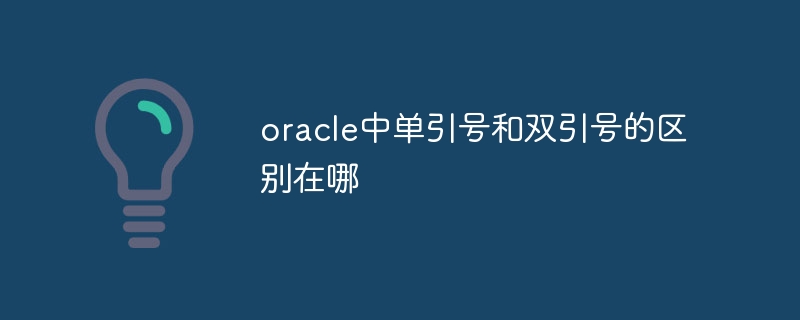In Oracle, single quotes are mainly used to define string values and identifiers, while double quotes provide functions such as escape character processing, identifier conflict resolution, and string concatenation: Escape character processing: double quotes Escape characters are allowed, single quotes are not. Identifiers: Single quotes are used for object names, double quotes are used for object names that conflict with keywords. String concatenation: Double quotes concatenate strings and the escaped characters they contain, while single quotes only concatenate the string value itself. Comments: Double quotes can be used for inline comments, but single quotes cannot.

The difference between single quotes and double quotes in Oracle
The single quotes and double quotes in Oracle are defined in strings are used to specify string values, but there are key differences between them:
1. Escape character processing
Example:
<code class="sql">-- 单引号中无法转义换行符 SELECT 'Hello\nWorld'; -- 输出:Hello -- World -- 双引号中可以使用 \n 转义换行符 SELECT "Hello\nWorld"; -- 输出:Hello World</code>
2. Used for identifiers
##Example:
<code class="sql">-- 表名为 "table" CREATE TABLE "table" (id NUMBER); -- 列名为 'name' ALTER TABLE table ADD COLUMN 'name' VARCHAR2(255);</code>
3. String concatenation operation
<code class="sql">-- 单引号连接 SELECT 'Hello' || 'World'; -- 输出:HelloWorld -- 双引号连接,保留换行符 SELECT "Hello" || "\nWorld"; -- 输出:Hello World</code>
##Single quotes:
cannot be used for inline comments.<code class="sql">-- 单引号不能用于行内注释 SELECT * FROM table -- 这里不能用注释 -- 双引号可以用于行内注释 SELECT * FROM table "My Table" -- 注释</code>
Single quotes and double quotes in Oracle have their own uses and characteristics. Mainly used to define string values and identifiers, while double quotes provide additional functions such as escape character processing, identifier conflict resolution, and string concatenation
.The above is the detailed content of What is the difference between single quotes and double quotes in Oracle. For more information, please follow other related articles on the PHP Chinese website!




